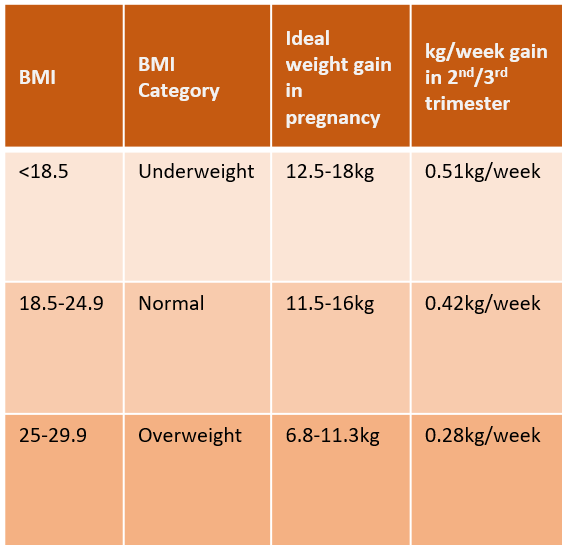The most common question that I receive is “Dr Kiran, I’m gaining too much or not enough weight, and is there any risk to my baby”. It’s an excellent question. Pregnancy is a great time to optimise your health which will have lifelong benefits to you and your baby.
What makes up weight gain in pregnancy?
The vast majority women gain weight in pregnancy. What makes up that weight is about 3kg baby, and the rest is fat, “oedema” or increased fluid in pregnancy, more blood volume in pregnancy, “amniotic fluid” or the fluid around the baby, placenta and womb that grows in size. The breast tissue can also be larger.
What’s a normal weight gain in pregnancy?

Effects of too much or too little weight gain
How much weight you gain does have the potential affect (1) your health, and (2) your baby’s health.
The effects on your health and your baby’s health depends on (1) your BMI or Body Mass Index, and (2) how much weight change there is in pregnancy.
From your health point of view, women with a high BMI at the start of their pregnancy (or in women who gain too much weight) can increase the risk (I emphasise not cause and effect), of conditions like diabetes in pregnancy or “gestational diabetes”, blood pressure problems like “pre-eclampsia”, blood clots in the legs or the lungs, problems around birth and breastfeeding. It’s also not an easy task to lose “pregnancy weight” post-partum which can affect your overall cardiovascular risk profile and risk in a future pregnancy. For the babies as well, they are more likely to be overweight.
If you are in the overweight category or above, it’s probably less concerning if you don’t gain an adequate amount of weight in pregnancy, as long as you maintain a healthy well balanced diet. The evidence is less clear on the risks in this category.
On the other side, in women with low BMI (or have inadequate weight gain), the risk is having a baby pre-maturely or a baby that is smaller than average in weight, which can have short-term and long-term consequences. By the way, it’s fairly normal to not gain much weight in the first trimester due to nausea/vomiting and food aversions; most gain only 0.5-2kg in the first trimester.
Assess where you are at and work on yourself pro-actively.
The first step is do a weigh in and work out your BMI. You need your height in centimetres and weight in kilograms. There are plenty of BMI calculators online, e.g. http://healthyweight.health.gov.au/wps/portal/Home/helping-hand/bmi
Then, think about what you ate and drink in a typical day – be honest with yourself. It’s not necessary to “eat for two” – that’s an outdated philosophy and can do harm. Do you drink 6-8 glasses of water? What’s your snacking like? (I find the best judge of this: would you show your pantry to your work colleagues?). Do you have smaller but more regular (say 4 meals a day), or do you have a big breakfast and dinner and fall asleep? Is your diet truly well balanced and colourful? Do you eat until you are just satisifed or full with a sore tummy?
How much exercise do you do? The recommendation is (3-4 times a week, every second day) at least 30-60 minutes each time. Aim until you’re a slightly out of breath which can be achieved by brisk pace walking, stationary cycling, or endurance exercises with light weights or body weight.
Where to next?
If you have a low or high BMI, speak to your Obstetrician about a referral to a Dietitian who can guide on ideal calorie intake and achieving that with safe foods in pregnancy. Dietitians are great as they can do this on a personalised and individualised way.
– If you have a low BMI of <18.5, then your Obstetrician will ensure there’s nothing causing that low BMI like unresolved nausea/vomiting or any underlying medical conditions (e.g. thyroid conditions). Your Dietitian will guide you foods that have healthy fats such as fish, nuts, oils, seafood and avocadoes.
– If you have a high BMI >25, then the Dietitian will guide on a healthy balanced diet. Women should not engage in diets in pregnancy – there are some questions about the risks of weight loss in pregnancy.
I hope that snippet of information helps you on the importance of a healthy weight in pregnancy.
Dr Kiran is highly trained and passionate Obstetrician & Gynaecologist with a holistic approach. He is patient and caring. Dr Kiran is based in South East Melbourne. He consults in the Casey and Frankston areas, with his main rooms in Berwick.
Contact our rooms to arrange an appointment.

